Before IPOB, There Was MASSOB: Nigeria’s Long History Of Biafran Nationalism
Since Nigeria's civil war ended decades ago, many groups have continued to advocate for the secession of a Biafran Republic. Today, IPOB is the loudest voice. That title, however, used to belong to another group – MASSOB – which implemented a similar playbook. We go back in time to reconstruct the rise and fall of this organisation.
Chapter I: How it started
Olusegun Obasanjo, Nigeria’s first democratically elected president in 16 years, had three big worries in 1999: how to keep the military from grabbing power for the umpteenth time, how to rescue the country from the dire depths of debt, and how to keep the ‘Giant of Africa’ from breaking apart.
One man occupied centre stage as far as the third problem went. Four months after Obasanjo was sworn into office, Ralph Uwazuruike started a group called the Movement for the Actualisation of the Sovereign State of Biafra (MASSOB). As the name suggests, he aimed to carve an independent nation out of Nigeria — particularly the southeastern region — known as the Republic of Biafra.
The vision was not new. Nigeria had gone to war over the Biafran question between 1967 and 1970 when Uwazuruike was just entering adolescence. That civil war was responsible for between half a million and three million deaths — so, possibly one out of every 20 Nigerians at the time lost their lives. One of the victims was Apollonia, Uwazuruike’s younger sister, who is said to have died in his arms.
Nigeria is a country of many nations. Like other African countries, its borders were drawn by European imperial powers in the 19th century, driven mainly by economic and diplomatic interests. In 1914, the British authorities joined the protectorates of Northern and Southern Nigeria — again for economic reasons. As a result, present-day Nigeria comprises well over 250 ethnic groups speaking an even greater number of languages, which have been forced into a political marriage. Of these ethnicities, the Hausa and Fulani dominate the northern region, the Yoruba dominate the South West, and the Igbo dominate the South East. This is why statesman Obafemi Awolowo famously described Nigeria in 1947 as “a mere geographical expression [because] there are no ‘Nigerians’ in the same sense as there are ‘English’ or ‘Welsh’ or ‘French’ [people]”.
After the country gained independence in October 1960, the ethnic fractures widened, forming a hole that nearly swallowed it. A military coup in January 1966 set off a vicious chain of events. Some of the coup leaders were Igbo soldiers, and many of the prominent casualties coincidentally came from other regions, including Prime Minister Abubakar Tafawa Balewa and Premiers Ahmadu Bello and Samuel Ladoke Akintola. Though the coup failed, it paved the way for Johnson Aguiyi-Ironsi, an Igbo man from Abia state, to become the military head of state. For these reasons, many perceived the coup to be ethnically motivated. Riots broke out in the North, leading to what came to be known as the anti-Igbo pogrom. Tens of thousands of people were massacred; many more became displaced. Six months after the first military takeover, northern officers staged a countercoup and installed Yakubu Gowon as the head of state. His attempts to broker peace between the various regions, however, failed. Finally, on May 30, 1967, Odumegwu Ojukwu, who was military governor of the Eastern Region, declared the secession of the area — calling it the Republic of Biafra. The civil war commenced weeks later.
When Ojukwu made the declaration, he sat in front of a flag much different from Nigeria’s. Its colours – red, black, and green — lined up horizontally. The flag was a simplified version of the Eastern region’s original coat of arms. At the centre stood a yellow semi-circle surrounded by wavy spikes. It represented a partial glimpse of the Sun on the occasion of its rising and was placed on a long bar of the same colour.
Biafran soldiers fought to have that flag and their sovereignty recognised, but it came at a huge cost. Tens of thousands of people died on the battlefield. Many more died of starvation, no thanks to the Nigerian government imposing a blockade and deliberately cutting food supplies after capturing the coastal city of Port Harcourt. Being one of the first televised wars in history, pictures of severely malnourished, bony children spread to and horrified people across the world.
“We were eating so many funny things. People suffer[ed]. All these lizard[s], all those things are meat then. And rats. People were eating rats,” recalled Theresa Nsionu, one of the survivors interviewed in 2017 by Biafran War Memories, a digital archiving initiative founded by journalist Chika Oduah. According to a word cloud at the bottom of the website, kwashiorkor, malnutrition, salt, and starvation were some of the most recurring highlights in the interviews.

Nearly three decades after the final bullet went off, Nigeria’s yellow sun again threatened to split in half with the emergence of MASSOB. However, today, when people think of the agitation for the independence of the Biafra Republic, it is not MASSOB that comes to mind but another group: the Indigenous People of Biafra (IPOB), founded years later by Nnamdi Kanu — a British Nigerian born in Abia state three months after the war broke out.
Information about how MASSOB operated cannot be fetched easily through an internet search partly because of how long ago it was. But a huge slice of that era is now available thanks to Archivi.ng, a project that is digitising decades of local newspaper publications. HumAngle pored through scores of pages from P.M. News between 2000 and 2010 and was able to draw many parallels between the tactics and experiences of MASSOB and those of its younger counterpart. It is a classic example of history repeating itself.
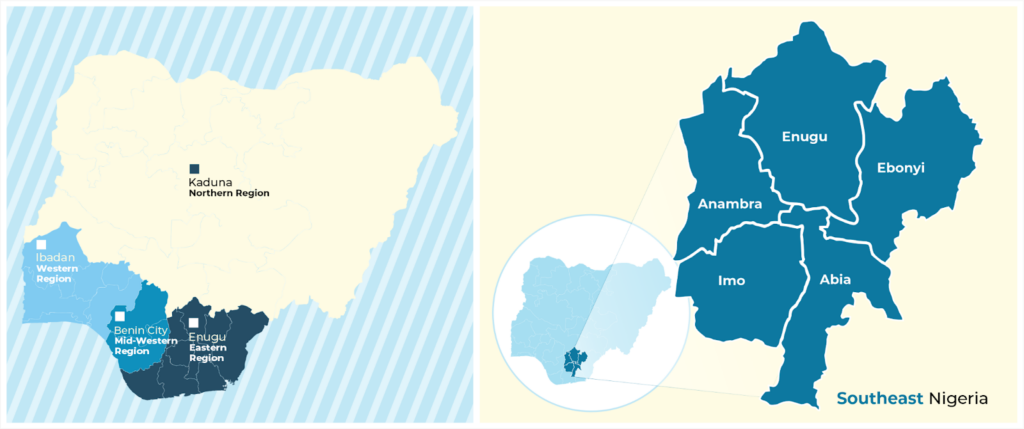
Chapter II: Non-violence
Sometime in April 2000, when MASSOB was only seven months old, a reporter from P.M. News sat with Uwazuruike to talk about his crusade. There are many takeaways from that interview. One, the newspaper acknowledged that at the time, many saw Uwazuruike as “a mere rabble-rouser who should not be taken seriously.” Beyond that, we learn about the man himself, his ambitions, and what he was prepared to do to achieve them.
He has multiple degrees from India, studying Political Science at Panjab University and Law at Bombay University before getting called to the Nigerian Bar in 1991. According to him, the reason he went to India was his fascination with Mahatma Gandhi (who was also a lawyer). Like Gandhi, Uwazuruike insisted he practised non-violence. But unlike Gandhi, he apparently did not believe in non-retaliation.
“Nobody has a monopoly of violence,” he said during the interview. “If they want violence, we will give it to them. They have not even seen violence … We, the Igbos, have fought a civil war in Nigeria, so we know what violence is about. We are ready for any eventuality.”
Moments later, he threatened to attack Yoruba leaders and “raze the whole of Lagos” if harm came to Arthur Nzeribe or his properties. Nzeribe, a federal lawmaker, had controversially moved for President Obasanjo’s impeachment at the national assembly.
“We will make the entire Lagos boil,” he warned.
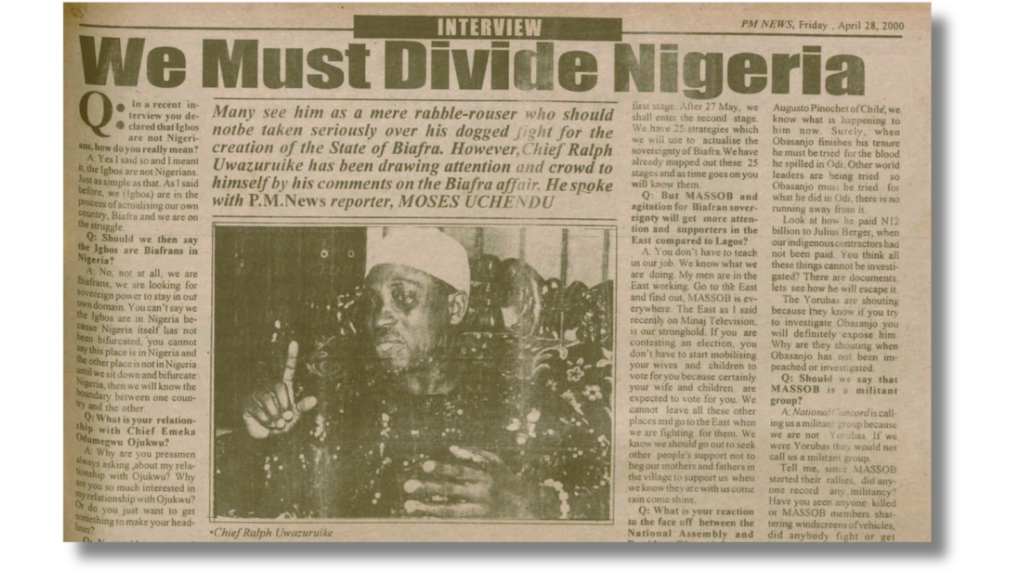
You do not need to dig too deeply into speeches, posts, and articles by IPOB members before coming across similarly inciteful language.
As far back as September 2015, Nnamdi Kanu was reported to have called for guns and bullets to defend their land at the World Igbo Conference in the United States. During the anti-police brutality protests of October 2020, he notoriously called for attacks on security personnel through broadcasts on Radio Biafra. “Biafraland will be a graveyard for the Nigerian Army. What is left of them, we are going to kill them. The mother of all wars is going to come,” he declared in one of such broadcasts on Oct. 27. “Anybody wearing police or army uniform is an enemy of the people. Anywhere you see them, you take them down,” he said in another.
BBC also found posts by influential IPOB supporters on social media calling for their adversaries to be beheaded and burnt to ashes. “One of the ways the media warriors attempt to avoid censorship is to switch into local languages that are less well moderated,” the broadcaster noted.
Simon Ekpa, leader of the Autopilot faction of IPOB that emerged in July 2021, has continued to push the hateful rhetoric, perhaps even more brazenly. Through his Twitter account, he has repeatedly urged and celebrated the killing of Nigeria’s security personnel, whom he refers to as terrorists.
“The terrorist @HQNigerianArmy knows they’ve lost the war. I therefore call on Biafra Liberation Army, Biafra Resistance Fighters and other armed groups defending themselves to increase the wotowoto on these terrorists until they are all gone and kiss dust, only then, there will be peace,” he posted on Thursday, June 27.

Less than a month after he granted the P.M. News interview, Uwazuruike hoisted the Biafran flag in the city of Aba. He had done the same weeks earlier when he launched MASSOB’s secretariat in Lagos, setting the ball rolling for a years-long campaign for self-determination. The group, which hoped to have Biafra resuscitated by 2003, would go on to amass widespread support so much that Nigeria’s domestic intelligence chief would estimate in 2006 that it had over two million members. Some even described Uwazuruike as a divine instrument.
President Obasanjo was, however, not prepared to lend a listening ear to this God-sent fellow. To him, MASSOB was like the Bakassi Boys, a vigilante group that operated in the southeastern region and which was notorious for the extrajudicial murder of anyone they considered a criminal. Both groups were bad for the growth and survival of the country, Obasanjo said in 2001. The group was also often compared with the Oodua People’s Congress (OPC), a nationalist and vigilante organisation in the South West established following the annulment of the June 12 presidential election of 1993. OPC became infamous for killing hundreds of unarmed civilians, often targeting people from other ethnic groups.
The Nigerian government did not waste time in clamping down on MASSOB. As early as May 2001, it had reportedly jailed over 2,500 of its members and killed “hundreds” more. The police had a long list of allegations against the group: illegal extortion, rape, murder, home invasions, and stealing. According to police spokesperson Haz Iwendi, MASSOB operated its own cells where it detained and tortured perceived enemies.
Chapter III: Popularity
It is difficult to tell just how popular MASSOB was among ordinary people in southeastern Nigeria in its heyday.
There were instances of interest groups, such as the Mgborogwu Cultural Association in Lagos, distancing themselves from MASSOB. But some of these statements may have been sponsored. The Mgborogwu Cultural Association, for example, has very few footprints on the internet, all of which revolved around defending the Bola Tinubu government in Lagos state. (Sketchy civil society organisations paid to make pro-government press statements are common in Nigeria.)
On the other hand, MASSOB enjoyed the support of the Ọhanaeze Ndigbo, the widely recognised sociopolitical group representing Igbo interests in Nigeria. In 2000, the two groups reconciled following a sour relationship, after which MASSOB officers were often invited to Ọhanaeze events. At a point, MASSOB even proclaimed that any Igbo person nominated for public office must first get the Ọhanaeze’s approval.
One thing that boosted the group’s popularity among Igbo people was the support it received from former Biafran leader Ojukwu.
Uwazuruike rode on Ojukwu’s fame to get legitimacy for his movement. He claimed he served Ojukwu for five years. When asked about this during the April 2000 P.M. News interview, he clarified that he served him “as a follower” and studied him the same way he studied his other heroes like Gandhi. He further described his relationship with Ojukwu as “very cordial”.
Ojukwu had originally described MASSOB as an “unserious people pursuing phantom visions” but later warmed up to the group and declared his strong support — coincidentally after losing the presidential election of April 2003. In return, MASSOB also staunchly stood behind him when he was invited by the State Security Service (SSS) and tried to prevent his arrest. “MASSOB is Ojukwu’s child. He has no choice than to support the movement,” Uwazuruike declared proudly in 2004. Shortly afterwards, he claimed the federal government had hatched a plan to assassinate both him and Ojukwu.
Meanwhile, not only did MASSOB attract a huge number of supporters, but it also had structures outside the South East. Its tentacles were particularly rooted in Lagos, where it established a secretariat. It had a South West coordinator as well as coordinators and meetings even in northern states like Kaduna.
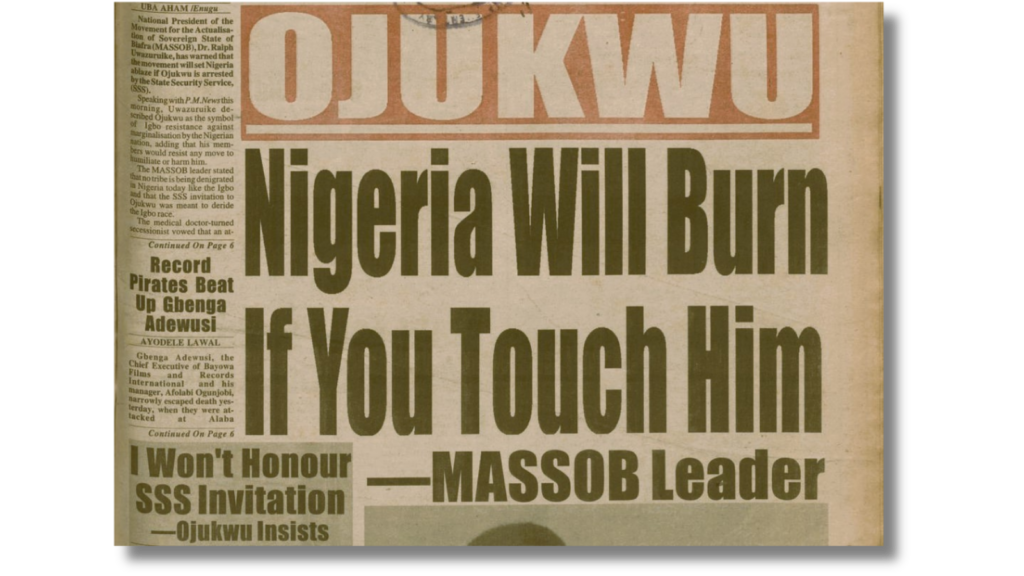
Chapter IV: Propaganda
Another tactic we see IPOB using, which was previously adopted by MASSOB, is to sow seeds of doubt regarding who was responsible for what or to outrightly deny allegations of criminal conduct that may tarnish its reputation.
In November 2005, when MASSOB members went on a rampage in Onitsha and Enugu, obstructing traffic and setting fire to houses to protest Uwazuruike’s detention, some of the buildings that were destroyed belonged to the first indigenous Nigerian president, Nnamdi Azikiwe, an Igbo person from Anambra. The former president’s car was also burnt, and some suggested that this incident could cause MASSOB to lose support from many people from the region.
The group’s spokesperson, Uchenna Madu, reacted to these reports by blaming “agents of the federal government” for destroying the properties as a way to discredit them and sabotage their struggle. The previous year, MASSOB also had to deny responsibility for the kidnapping of a commissioner in Anambra.
This is akin to the popularisation of the “unknown gunmen” phrase by IPOB members starting in 2021, which allowed them to celebrate attacks, especially on security forces, without explicitly taking responsibility.
There are other similarities between MASSOB and IPOB regarding their approach to propaganda.
We see, for example, how MASSOB celebrated George W. Bush’s reelection as U.S. President in 2004, saying they fasted for this outcome because Bush was a “sort of messiah whose divine duty is to liberate people from bondage”. “He liberated the Afghan people, and he is now liberating the Iraqis,” argued MASSOB coordinator Emmanuel Okeke. Today, IPOB members also try to paint a picture of widespread support from foreigners and foreign governments.
We see how they attacked press reports and accused journalists of having hatred for the Igbo people. Uwazuruike particularly said this about P.M. News, which is headquartered in Lagos. Today, IPOB members are fond of condemning the mainstream media or what they tag as “Yoruba media” and have invested heavily in floating their own news blogs.
We see how MASSOB incited public sentiments following the emergence of jihadist extremists in northeastern Nigeria, riding on this to heighten the Igbo people’s sense of danger and spirit of nationalism. In 2009, just after the Boko Haram uprising in Borno state, for example, MASSOB claimed it had uncovered plots by the insurgents to attack the South East. They had stockpiled arms inside mosques in the region, it said, going on to mention specific Muslim worship centres. It added that the killing of Boko Haram founder Mohammed Yusuf by the police was an attempt to cover up evidence of this scheme. Today, claims surrounding the plot to Islamise Nigeria form one of the main pillars of IPOB’s propaganda.
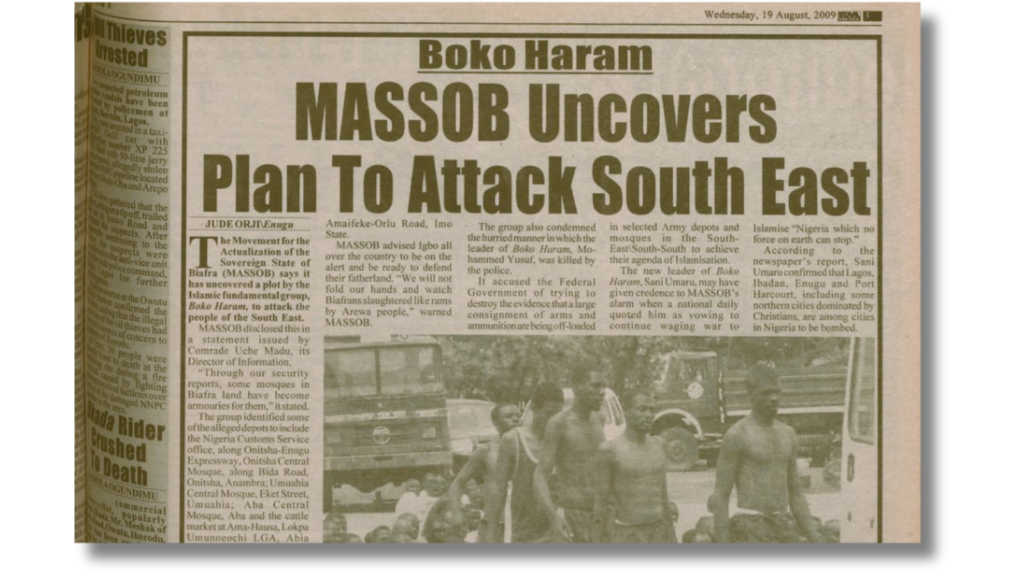
Chapter V: Diaspora backing
The Biafran struggle has often received significant support outside the shores of Nigeria. Countries such as France, Portugal, and South Africa provided military and humanitarian support during the civil war. Then, there were private individuals who protested the killing of people in the breakaway nation, notable among whom was Bruce Mayrock, a young American who set himself on fire at the United Nations headquarters in May 1969.
Since the war, however, the struggle has leaned against support from Nigerians in the diaspora, offering not only their voice but also their money. This is true for both MASSOB and IPOB.
“MASSOB and the struggle for Biafra is being funded by individual members. We have more than three million members all over the world,” Uwazuruike claimed in that April 2000 interview. “We have friends overseas who are sympathetic to the Biafran course. We also have so many Igbo citizens abroad who are in America, London contributing their dues in hard currencies.” Years later, in 2008, he claimed that MASSOB had over 20 groups in the diaspora.
IPOB similarly has active members living in dozens of countries worldwide who help with its internet campaigns and fund-raising drives. According to the Nigerian Financial Intelligence Unit (NFIU), most of its revenue comes from Brazil, Britain, China, Germany, India, Indonesia, Ireland, Italy, and Malaysia.
Chapter VI: Sit at home
A common thread in how MASSOB and IPOB have protested government reaction and drawn attention to their struggle is the sit-at-home orders. These are directives issued to residents to remain indoors on particular days as a form of civil disobedience. However, the separatist groups usually do not stop at just asking people nicely; they also violently enforce these directives.
The first of such sit-at-home orders came in August 2004. Only about 1 per cent of Nigeria’s population had internet access at the time, so Uwazuruike had to relay the message through a letter, which was then photocopied and distributed. He titled it “Call for Voluntary Stay at Home” and called on Biafrans to remain indoors between 6 a.m. and 4 p.m. The sit-at-home lasted between Aug. 26 and 27 and enjoyed widespread compliance. Markets shut down in many cities in southern Nigeria, including Aba, Enugu, Onitsha, and Port-Harcort. Some Igbo traders in Lagos also closed their shops. Many Igbo people did not travel to their hometowns for the New Yam festival as was customary because of the protest and the “negative signals” they were receiving.
More sit-at-home orders followed. In December of the next year, MASSOB embarked on another two-day sit-at-home protest to take a stand against Uwazuruike’s arrest and prolonged detention. Again, in many parts of the South East, commercial activities were paralysed, bank operations were suspended, schools recorded low attendance, markets were shut, and streets were deserted. Commercial motorcyclists who came out for their daily bread were instructed to return home by MASSOB activists, who mounted roadblocks in different places — even though they had again described the action as voluntary in the leaflets shared.
Chuka Obi, a restaurant owner at the Amawbia Main Market in Anambra, said all the food he bought went to waste because of it. “It was even more painful because we could not store the food due to power outage,” he told the press.
But beyond the huge impact the strike had on businesses, lives were lost as well. According to the police, a MASSOB activist shot a woman, Ngozi Anyaegbunam, in Onitsha because she opened her restaurant. Seven members of the separatist group were also killed during a clash with police officers in Owerri.
Continued clashes between MASSOB and the police created cracks exploited by criminals, with armed robbery attacks rising sharply in places like Onitsha. It was so bad that a curfew was imposed by the Anambra state government, and then-governor Peter Obi instructed security officers to shoot violators on sight.
Later on, there appeared to be targeted abductions and killing of security agents by suspected MASSOB members in the South East, just as we see today. There was also at least one report of suspected separatists attacking politicians and residents.
The SSS claimed after a raid on Uwazuruike’s home in Imo state in September 2005 that they found locally made rockets as well as army uniforms and boots. The intelligence agency’s state director, Alex Amaechina, also said they arrested a soldier who had been discharged by the Nigerian Army in 1996 at the MASSOB headquarters.
The group had become so notorious for its violent tendencies that the following year after Uwazuruike’s arrest, the Keffi prison authorities wrote to the court saying they could no longer hold him due to the security implications.
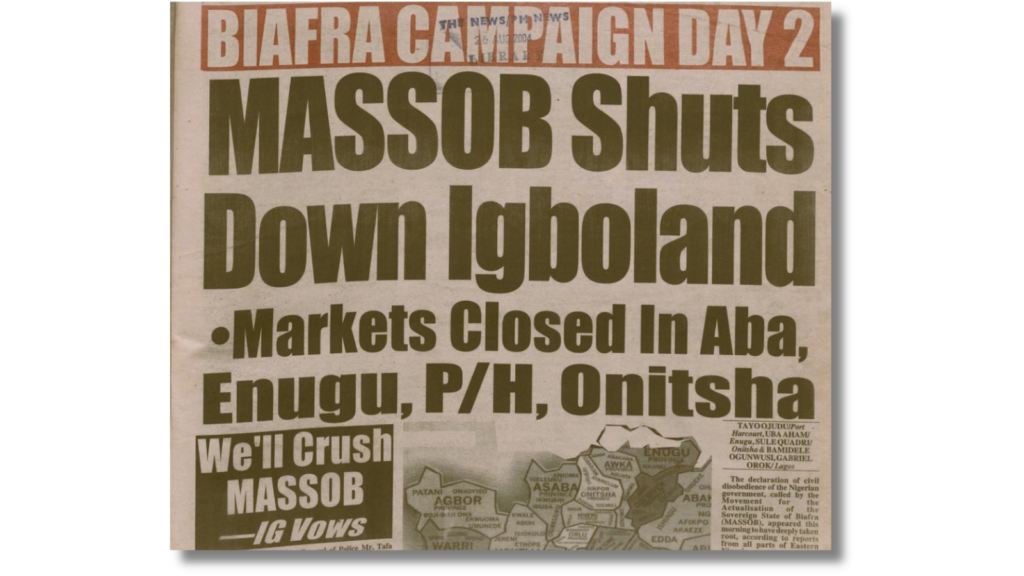
The sit-at-home menace returned with more ferocity under IPOB. After Nnamdi Kanu’s arrest in June 2021, his followers ordered illegal curfews on Mondays and other days when Kanu made a court appearance to pressure the government into releasing him. Two months later, it announced that it was suspending the Monday sit-at-home directive. However, the breakaway faction of Autopilot has continued to enforce the order across Nigeria’s southeastern states and parts of the South-South, which has devastated businesses, schooling, and cultural practices.
Many lives have also been lost in the process, including security personnel and civilians — either as IPOB militants try to enforce the sit-at-home order or to general insecurity. Some of the victims were beheaded. In July 2023, gunmen killed three tricyclists in Ebonyi state. “Shoot them, kill them, destroy everything and set it on fire, since they cannot obey simple instruction,” they said in a video.
The armed separatists are, in fact, not deterred by several calls from Kanu himself to suspend the sit-at-home order and restore peace to the region. Speaking to journalists in court in June this year, he condemned the attacks on soldiers. “I don’t want anybody to die. We are fighting for freedom, then how can we fight for death?” he said.
The next day, Ekpa posted tweets celebrating the murder of soldiers. “You declared war but you are falling and casting, e don cast,” he mocked. “The terrorists are kissing the dust in Biafraland.”
A decade ago, the South East was the most peaceful of Nigeria’s six geopolitical zones. Now, it is the most dangerous place to live in Southern Nigeria. Analysis of data collected by the Nigeria Security Tracker (NST) showed that in 2022, there were nearly as many civilian lives lost to insecurity in the South East (234) as there were in the BAY states of Borno, Adamawa, and Yobe (272), which are the hotbed of the Boko Haram insurgency. In the same period, 120 security personnel were killed in the South East compared to 44 in the BAY states, and 307 people were abducted in the South East compared to 69 in the BAY states.
As a result of the crisis, many people have fled their communities. Others living in other parts of Nigeria or abroad are afraid to travel home.
“A relative did a traditional marriage in our village. Nobody went. Fear didn’t allow anyone to go. The security agents come from Owerri and then go back because many of the police stations have been destroyed,” Chike Anyikwa, who is from Imo state, told BBC last year.
Chapter VII: Treason
MASSOB did not mince words or drag its feet when it came to delegitimising the political structure known as Nigeria. For the group, it was an absolute necessity that a referendum took place to properly delineate the country and determine which parts are in Nigeria and which parts belong to Biafra. Beyond this, it also often acted as though Biafra already existed, even without this referendum, in ways that could be interpreted as treasonable.
For example, months after establishing MASSOB, Uwazuruike declared that Igbos should no longer consider themselves Nigerians. The group orchestrated and encouraged the hoisting of the Biafran flag in different parts of the country. It also promoted the circulation of the Biafran Pound, a currency that was originally used by the breakaway nation during the civil war.
The group launched a sensitisation campaign to encourage the currency’s adoption, tagged Operation Back to Locus. MASSOB spokesperson Madu claimed in August 2005 that over 40 million people had accepted the currency and were using it for transactions. He even boasted that the Biafran Pound was stronger than the Naira as one of the former equalled 250 of the latter.
MASSOB threatened to disrupt democratic processes such as the conduct of a national census and elections. It also threatened to declare a state of Biafra, going as far as picking a date for this in January 2005 despite warnings from security operatives.
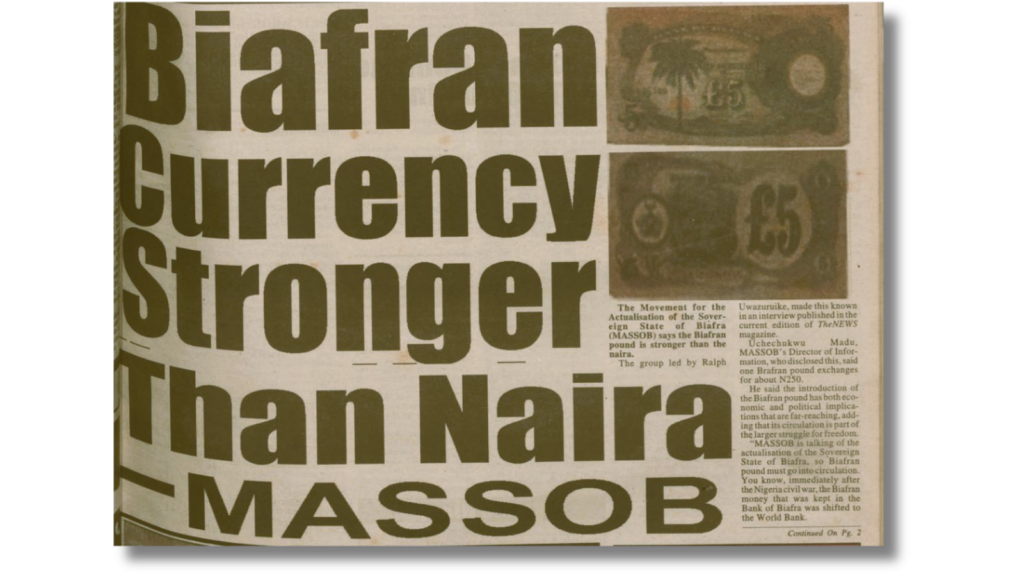
Meanwhile, IPOB took the treason baton and ran with it.
We see this in how its members attacked officials and facilities of Nigeria’s electoral commission in the build-up to the 2023 general elections. Forty-one of the commission’s offices were attacked between 2019 and 2021, many of them burnt.
We see it in how a faction of IPOB has constantly called for the killing of government officials, especially security agents, labelling them ‘terrorists’. We see it in the launch of the Biafra national identity card and plans to introduce an international passport.
Simon Ekpa, who is based in Finland, even now calls himself Prime Minister of the Biafra Republic Government in-Exile (BRGIE). His ‘government’ has several Twitter accounts opened for the ministries and departments of culture and tourism, foreign affairs and diplomacy, pharmacy and laboratory science, planning and strategy, police, transportation and logistics, and so on. There is also a media arm called Homeland Reports.
Chapter VIII: Gov’t fights back
How did the Nigerian government manage the crisis instigated by MASSOB? From what we can tell, it was mainly through the criminal justice system: the police, the courts, and the prison.
Banning the group in 2001 set the tone for the highhandedness that followed. The police launched a manhunt for members while domestic intelligence agents and soldiers raided their secretariats and headquarters. Dozens of MASSOB members were arrested and detained across the country without trial for a prolonged period.
There were also several cases of the extrajudicial killing of protesters. There are reports of a massacre on March 29, 2003, in Umulolo Okigwe, Imo state, that allegedly claimed the lives of over 600 MASSOB members.
Over the years, especially between 2005 and 2006, many MASSOB members were killed during clashes with security forces. One September 2005 protest in Anambra led to the death of a police officer and five separatists. Reports of MASSOB members being executed unlawfully date as far back as May 2000, when two young members, Gabriel Oga and Joseph Okereke, were killed by police officers who had stormed the group’s Aba secretariat to make arrests and remove hoisted Biafran flags. Uwazuruike had reacted at the time by urging his followers to remain calm and not resort to violence. MASSOB claimed that more than 2,000 of its members were killed between 2000 and 2008.
In January 2005, Uwazuruike claimed that over 2,000 members of his group were languishing in detention (a press report around the same time estimated the number to be at least 200). Many members, including Uwazuruike, fled their homes and went into hiding because of the arrests. Meetings had to be held discreetly. Those who were picked up were charged with treason, unlawful assembly, and membership of an illegal society.
Uwazuruike himself was arrested several times. The first was in April 2000 when MASSOB announced plans to raise the Biafran flag and release a coat of arms and anthem for the breakaway country. Security agents raided his home in Lagos but did not find weapons.
He was arrested again in October 2005 by SSS operatives who disguised as youth corps members in Uwazuruike’s hometown of Okwe in Imo state. MASSOB members reacted with a series of protests and threats to unleash mayhem. “If within seven days from today … our demand is not met, MASSOB should not be held responsible for anything that happens in Biafran territory,” warned the group’s deputy director of information, Chris Mocha, a day after the arrest.
The group’s leader was charged with treason and planning to “levy war in order to intimidate and overcome the president and the Federal Republic of Nigeria”. This time, he remained in detention for several years. Despite the passing of his mother, his bail application was not easily granted by the court. He was finally granted a three-month bail in October 2007 to allow him to properly bury his deceased mother, being the only surviving son. This was two years after his arrest and some months into the administration of President Umaru Musa Yar’Adua.
Uwazuruike was seemingly unfazed by the drawn-out detention. Shortly after his release, he said he would not be intimidated and vowed not to abandon the struggle. However, this period appears to have marked the beginning of MASSOB’s slip into irrelevance.
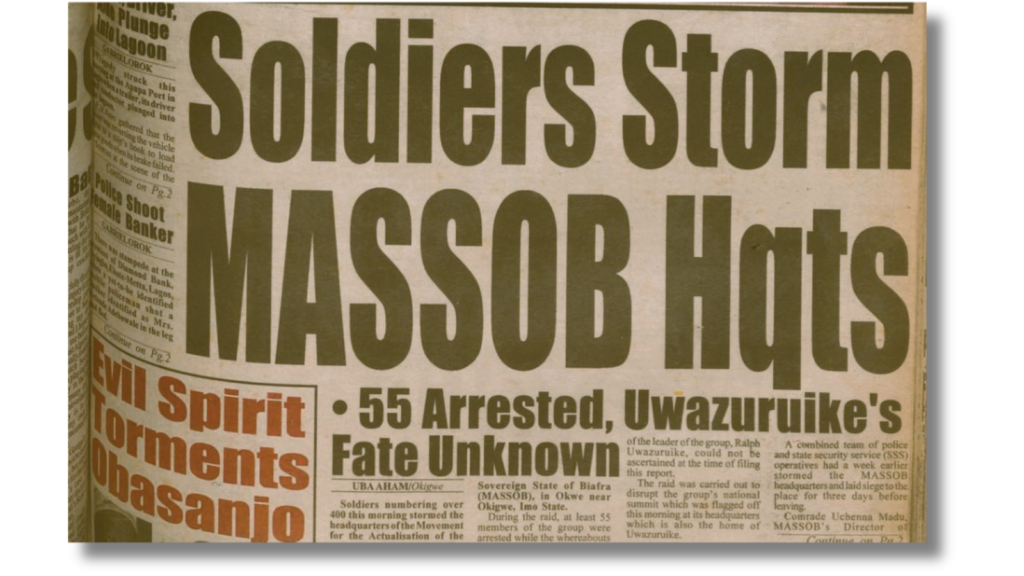
The authorities are using similar tactics to try to crush IPOB’s campaign for secession.
For one, Nnamdi Kanu has now been kept in detention for over three years. Like Uwazuruike, his multiple bail applications have been rejected by the Federal High Court in Abuja — his case coincidentally presided over by Binta Nyako, the same judge who heard Uwazuruike’s about a decade ago. Many, including Amnesty International and the US Department of State, have berated the Nigerian government’s handling of Kanu’s case and accused it of violating his right to fair hearing.
There have also been many cases of mass arrests and unlawful killings.
One particularly gruesome case was the massacre of over 150 unarmed pro-Biafra protesters between 2015 and 2016. “In many of the incidents detailed … the military applied tactics designed to kill and neutralise an enemy, rather than to ensure public order at a peaceful event,” Amnesty International revealed. The international non-profit noted that the deadly repression further stoked tensions in the region and recommended that the perpetrators be brought to justice.
In September 2017, five months after Kanu was released on bail, soldiers stormed his home in Abia state and allegedly killed five people, injuring dozens of others. The next day, the Nigerian Defence Headquarters declared IPOB a “militant terrorist organisation”. It was after this incident Kanu jumped bail and left the country.
Perhaps as a way to justify its highhanded approach to suppressing the movement, the government got a court order proscribing IPOB and declaring its activities ‘acts of terrorism’ in September 2017.
Security forces continued to commit human rights violations in the South East, including “sweeping mass arrests, excessive and unlawful force, and torture and other ill-treatment”. According to Amnesty International, they killed at least 115 people between January and June 2021. The organisation further pointed out that many of the people arrested were “randomly picked up in their homes and off the street”.
Nigerian authorities have used the same repressive tactics in response to other issues, such as Shiite protests and the Boko Haram crisis. Oftentimes, they tend to validate grievances and worsen the crises. Ekpa, for example, has repeatedly referenced extrajudicial killings and mass arrests as his reason for instigating violence in the country.
Chapter IX: Things fall apart
One of the signs of MASSOB’s depleting strength was the splintering of its followers.
In March 2007, the group denied issuing a sit-at-home order and denounced members making unauthorised publications on its behalf.
“They have been expelled from MASSOB [and] are serving their personal interests,” said the western coordinator, Ben Onuegbu. “People should also beware of their illicit method of extortion.”
One of the central points of disagreement among various members was whether the group should blatantly take up arms. A faction, reportedly led by Prince Chijioke Chukwujiudo, believed that adopting violent methods would make their advocacy more effective. They tried to persuade Uwazuruike in 2008, but he refused. When the pressure became too much for him, Uwazuruike banned the outliers from attending meetings at the headquarters, leading them to form an opposition group.
These cracks became obvious again in 2010 when MASSOB locked up one Pascal Okorie, a Nigerian-born American citizen, in its cell in Okwe, accusing him of belonging to a splinter group that planned to “organise and empower the so-called Biafra Army in readiness to disrupt” the gubernatorial election in Anambra.
Besides the exile of some of Uwazuruike’s followers, there are also reports of high-ranking members, including six directors, resigning from the group. One of them, David Mac David, who left in June 2008, accused the leader of compromising with the Federal Government and abandoning the scores of MASSOB members still detained across the country. (Uwazuruike had retorted that those directors were instead dismissed for receiving money to campaign for two governors during the 2007 elections.)
From the previous chapters, you can already tell that IPOB has suffered similar cracks in recent years. In 2021, following Nnamdi Kanu’s extradition and re-arrest, it split into two factions: the Directorate of State (DOS), headed by Chika Edoziem and Autopilot, led by Simon Ekpa. Ekpa has now rebranded as leader of the Biafra Republic Government in Exile.
“Nnamdi Kanu was and is still the leader of the Indigenous People of Biafra (IPOB) while we are in government,” he said in June.
Chapter X: How it’s going
Following Uwazuruike’s release from detention, the agitation for Biafra’s secession continued, but apparently not at the same tempo. MASSOB continued to call for sit-at-home protests. It did so twice in 2008 as a way of sending a “strong signal to the international community”.
But its calls carried a cautionary note.
“It is going to be peaceful and we are not going to force anybody to join,” its Lagos regional leader, Nnamdi Agomo, said in August that year. “There will be no rally. Everybody is expected to sit at home and pray for the freedom of Biafra.”
Uwazuruike continues to make the headlines, such as in 2022, when he uncharacteristically declared his support for the presidential ambition of Yahaya Bello — former governor of Kogi state, currently hiding due to money laundering charges. “I don’t believe in the idea of zoning system or Igbo president because zoning means sectionalism,” Uwazuruike had said when he led a solidarity march for Bello in Imo state.
He has called for Nnamdi Kanu’s release, but he is undoubtedly not a fan of IPOB, as he has often antagonised the group. The hostility is mutual, too, with IPOB describing the man as a “fly” it couldn’t be bothered to engage with. Both groups have accused the other of working with the government.
It is obvious that, in many ways, IPOB is treading a similar path as MASSOB. But the big question is this: If the day comes that it also returns to a genuinely non-violent struggle or is swept into distant memory, what guarantee is there that another armed separatist organisation will not be raised in its place?
Summary not available.
Support Our Journalism
There are millions of ordinary people affected by conflict in Africa whose stories are missing in the mainstream media. HumAngle is determined to tell those challenging and under-reported stories, hoping that the people impacted by these conflicts will find the safety and security they deserve.
To ensure that we continue to provide public service coverage, we have a small favour to ask you. We want you to be part of our journalistic endeavour by contributing a token to us.
Your donation will further promote a robust, free, and independent media.
Donate HereStay Closer To The Stories That Matter





